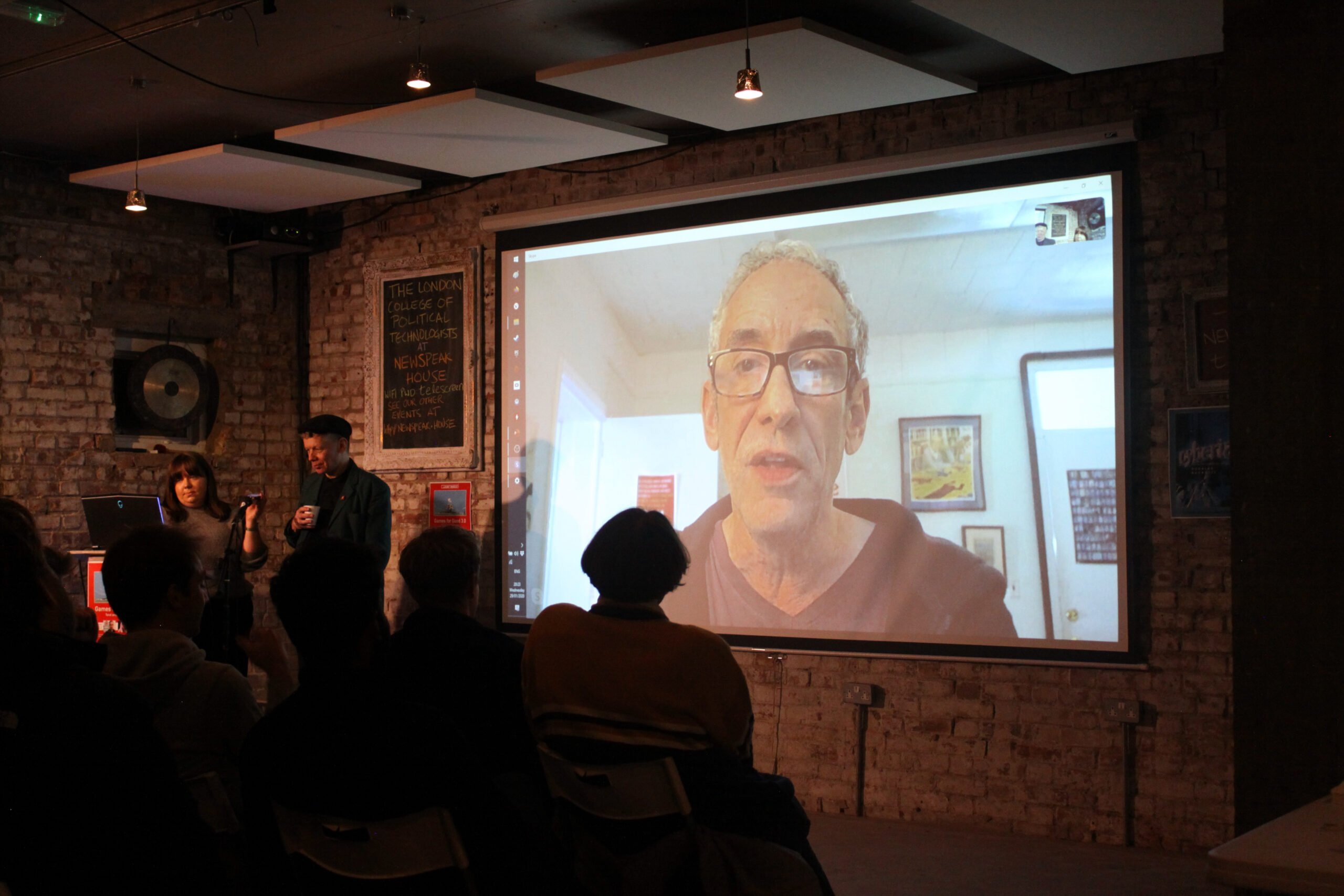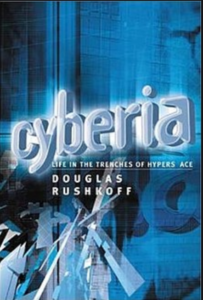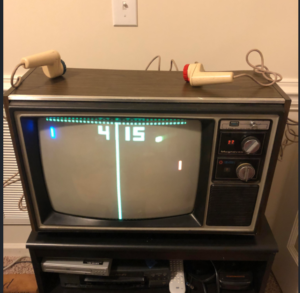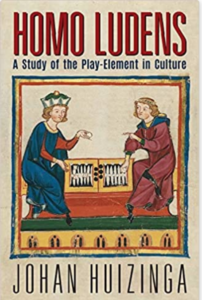
What are games for? – Douglas Rushkoff on Games for Good 3.0
Dr Richard Barbrook interviewed Douglas Rushkoff at Newspeak House for Cybersalon Tend & Befriend Games For Good 3.0
Douglas Rushkoff is the author of “Cyberia” a seminal book that came out in 1994 and gave a dystopian glimpse of the future when media and screens take over from physical world. The book has a strong counterculture feel to it and it applies a critical eye to assessing the technology ‘gifts’ that were heading our way in early 90ties. We have known Douglas since 1994 when I opened the first world’s Cybercafe Cyberia, and Douglas held his book launch at our café. Our name for the Café came from different inspiration, but when we read the book, we sensed a real kindred rebel spirit in him. 
Douglas is currently a lead on TeamHuman.fm, a brutal and thought provoking weekly podcast that questions every move that technology makes and brings the original creators of Virtual Reality, Gaia theory or Open Source to explain the tech-led mess we are in today.
Dr Richard Barbook is a Politics Lecturer at Westminster University, author of Class Wargames. He is a die-hard veteran gamer, leading investigation into games as tools of learning in both political and digital activism. In 1995 he wrote one of the most influential critiques of tech-optimism framework, titled California Ideology. He shares with Douglas a sense of fascination with networked technology but also a certain unease that it’s role is to lure us into addicted consumption instead of freedom and creativity, as the pioneers of Internet originally intended.
Dr Richard Barbook : Tell us about your experiences of playing games?
Douglas Rushkoff: I discovered games in mid 70ties, when it occurred it to me that you can control TV. This passive screen, with ‘stare only’ mode has suddenly became controllable. Pong came out and there was no more passive watching of something that someone else decided you should watch. We reclaimed our TV screens thru console and we never forgot that feeling of triumph and sense of freedom.

The story of discovery of new games is useful as our generation was alive before the games existed. If you were born before games, then you are going to be excited by it and it meant more control over your entertainment. The first moment I saw a videogame in a hotel, it was Pong. It was 2 white squares hitting a little ball back and forward.
Anyone from my generation would remember where they were when that happened, just like with Americans landing on the Moon. People thought it was a beautiful simulation of table tennis, we were just so happy we could move the pixels on the television, formerly a sacred turf of the great and good. “I love Lucy’ was what everyone was watching regardless if they liked it or not. Whoever was allowed to make TV had such power, like God.
To be able to put game images on the TV was an act of magic. The pixels have been liberated. From ‘read only’ media, to ‘read-write’ media. It was the very early glimpse of taking control of your digital creative world. You could have stories on the television where you are the protagonist, with you as the main hero fighting the elements. The player could make choices thru the game and see the impact on TV. It was truly liberating. It fundamentally shifted our relationship to the television (the big screen in the living room).
I think it opened up the idea for those of us who were around during the transition, from ‘read only ‘ to “read-write”, that we all started wondering what other media may be possible. For me it meant playability, it meant for me ‘open for my intervention’
Richard Barbook notes that it was Interactivity 1.0, Internet 1.0, there was no networked players but it was interactive. You could play against another person, there were 2 joysticks. It turned TV into a way to meet, rather than just to watch and be alone.
Richard Barbrook– so what do you think now, 30 year later, games have taken over, and now we have to deal with ‘gamification’. Game makers like Jane McGonigal talks about Gamification Revolution, where games can be used to teach us everything.
Richard notes it is very much in line with techno-optimism he wrote about in California Ideology We can make ourselves happy. Do you think this has legs?
Douglas Rushkoff: Well, it is always the tendency with new media to use them ‘to make people to do something’, to use it as a propaganda. Humans always end up messing up new media like that. The eternal question, how do we get people do follow us and so this or that. The temptation is to use the technology on the people. Whenever you get a liberative technology, the control people (‘them’) always show up. They don’t trust humans, they always try to find how to bend human behaviour to the liking by controlling elites. He compares it to Norbert Wiener talking about Systems Theory, then Margaret Mead popping out to ask how can we use it for pragmatic purposes. Everyone jumped at the opportunity to impose a content on the games in order to change human behaviour.
Of course I get it, there are some ways of conveying important, big ideas thru games, like thru a book, documentary. But I think you end up sacrificing the more important, vital element of games which is pure play, the spirit of play. The spirit is broken once you apply the play to a particular thing. When you play, you create a sacred circle around the player, once you step into the secret circle, nothing can matter. If you play basketball for money, that is not play but work. If you start attaching serious outcomes, then it loses spontaneity of play. You may lose the essence of the ‘thing’. Check out the book Homo Lutens. 
We should have less games like Monopoly, where the winner takes it all. You apply the energy for gain, for utilitarian purpose.
Richard Barbrook: Should games be then just trivial?
We should avoid games as part of ‘enterprise’. Instead we should be looking to have kids playing games together, collaborate. Games where you win as a group, as a team. We should play to trigger oxytocin or serotonin thru collective success, sense of joined achievement. Collaborative game is a practice for collaborative life.
The interested thing about gamification, is that it is taking energy from play and apply to something else. When business talks about gamification, it is just camouflaging of the real thing that is a game anyway. Stock market is a game, why teach it thru a game when it is a game? Stock market is not the real thing. It is gamification of sharing, so leave doing the simulation of that well alone.
Richard: Can we learn thru gaming? Is that the utilitarian way?
Douglas: We do learn thru gaming, we will practice for math quiz – but you are going to trust 11 year old to build a bridge based on the equasion they know? No, he is just playing with knowledge.
Richard Barbrook: How can we subvert that?
Douglas Rushkoff: We can subvert is by deciding the most important thing you can learn is how to socialise with other humans in the room. It is more about their body and my body, how do we share that space, and work on the game.
Team human is one of the ways to bring us closer together. When was teaching changed from being a play to work? Miners used to come to Working Men’s clubs to read for fun. Now we have university Deans going to corporate CEO and ask them what should Universities teach that makes businesses happy. It is absurd.
Games should be just for play, just pure celebration of being alive and celebrating of being with other people. There is a function but not the utilitarian context of industrial society.
We finished the event with a Discussion On Games’ raison d’etre.
A point is made that games are divisive in gender identities and there is a question what can be done about it to minimise gender gap. A games professor notes that games are about forming identities, about what is appropriate and what not. He noted that gender identities are formed by 12-13 amongst girls who game, but when they move to Year 9, they don’t really play games anymore. It is seen as ‘sad’ and ‘geeky’ thing to do. The girls don’t think is appropriate for their gender role. How can we address that and open games for all genders?
A veteran player in his 40ties notes that the playing gaming is more acceptable now, than 10 years ago. It is more acceptable to play in general and gaming somehow fell under that as the society is re-learning to value play (note beanbags and table tennis at work, daytime DJ events in collab spaces).
Douglas Rushkoff: The aim of capitalism is to make people to spend money on things that make them happy. If people can sit together, have fun and play games without spending money, it is a challenge for capitalism. He recommends to find time to sit with other people, be together without spending money, chose games over options that need money to have a good time.
(End of Interview).
Very shortly after this interview, lockdown came and Covid19 put capitalism on hold.
As I am writing up those notes during Corona lockdown, playing online games with my friends far away, it is uncanny how quickly Rushkoff’s prophecy came true. If we get thru this lockdown in one piece, as I did get through my 2 previous lockdowns it will be thanks to games (and some home-brew vodka).
In the meantime, watch the video from Doug’s interview and from our follow-up event Corona-Salon – Games for Survival.




